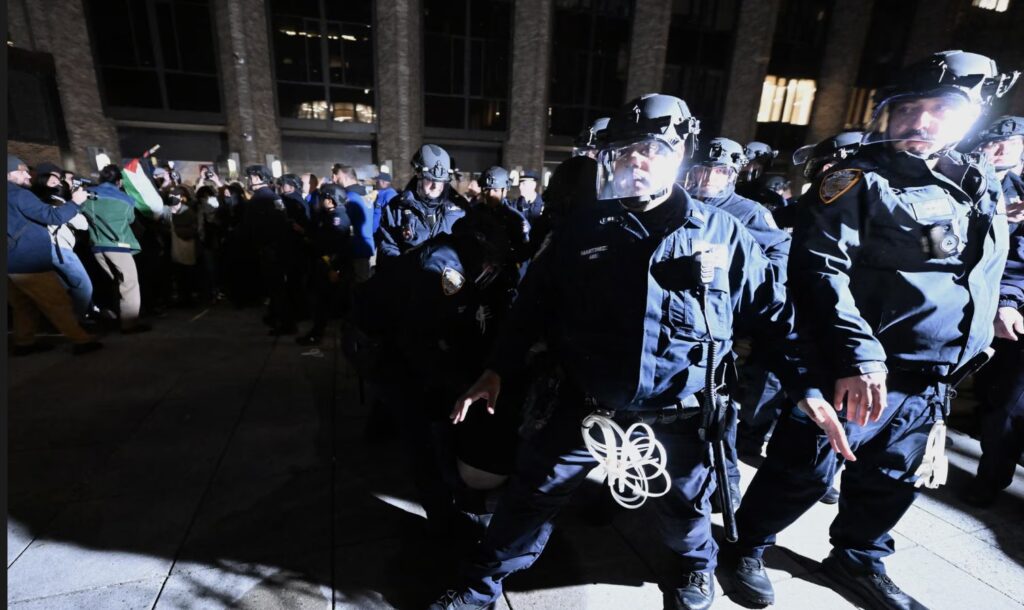
Protests have erupted throughout New York City’s college campuses, mimicking the continuing crisis in the Middle East. Columbia University is at the center of these demonstrations. Its campuses have become battlegrounds for opposing viewpoints, with each fervently lobbying for their cause.
Pro-Palestinian activists, motivated by empathy and solidarity, spoke out against the bloodshed in Gaza. Simultaneously, Jewish students voice their fears about safety and criticize what they see as anti-Semitic rhetoric.
The university’s management must strike a difficult balance. On the one hand, they support the ideas of free expression and peaceful protest. On the other hand, they are concerned with assuring the safety and well-being of every student.
In response, Columbia has stated that classrooms will provide virtual learning options when technology allows until the end of the spring semester on May 10, 2024. Safety is their first focus.
ALSO READ: Michigan Republican Ignites Backlash for Saying Gaza Should Be Treated Like Hiroshima
During pro-Palestinian protests at Yale University, scores of people were detained. These students are demanding that the institution disengage from interests related to Israeli military activities.
Their campsite, which was put up last week, drew hundreds of individuals who believe that financial links to military weapons makers fuel regional unrest and misery. In contrast, Jews for Ceasefire conducted a symbolic “Seder in the Streets,” a ceremonial supper marking the beginning of Passover, as an appeal for peace and discussion.
Hundreds of students at Stanford University in northern California staged a walkout. Additionally, their message echoes the global appeal for justice and human rights. Furthermore, they stand in solidarity with Palestinians and urge their university to take a position against violence and injustice.
Additionally, the walkout demonstrates their dedication to creating a school atmosphere that promotes empathy, understanding, and conversation.
POLL—Should the Government Implement Stricter Penalties To Combat Retail Theft?
On the Berkeley campus, students set up a Free Palestine Encampment. Palestinian flags wafted in the air, and banners and inscriptions expressed solidarity with Gaza’s inhabitants. The campsite vividly reminded people of the ongoing situation and the critical need for action. Students here are unwavering in their quest for justice and responsibility.
Furthermore, protests on college campuses in the United States mirror a bigger national discussion. They emphasize the conflict between free speech rights and the obligation to safeguard pupils from harm.
As the Israeli-Hamas conflict persists, colleges debate their role in molding public discourse and encouraging understanding. In these explosive moments, the fate of Palestinians in Gaza and the safety of Jewish students at home come together.
While the demonstrations may disturb the normal rhythm of campus life, they also serve as a forceful reminder that education is more than just textbooks and lectures. As students wrestle with these difficult concerns, colleges must strike a delicate balance between academic freedom and community well-being.
The disturbance on college campuses encapsulates the greater worldwide battle for peace, justice, and human rights. As the world watches, students band together, their voices resonating across New York and beyond.
You Might Also Like:
Amusement Parks in the US That Have Free Entry
How Often Should You Walk Your Dogs?
Authorities Arrest Minnesota Sen. Nicole Mitchell for Burglary
X Users Troll GOP Lawmaker Kat Cammack for Seeking To Ban Foreign Flags From House Floor
Jillian Michaels Doubles Down on Stance, Says Trans Athletes Should Not Compete Against Girls
